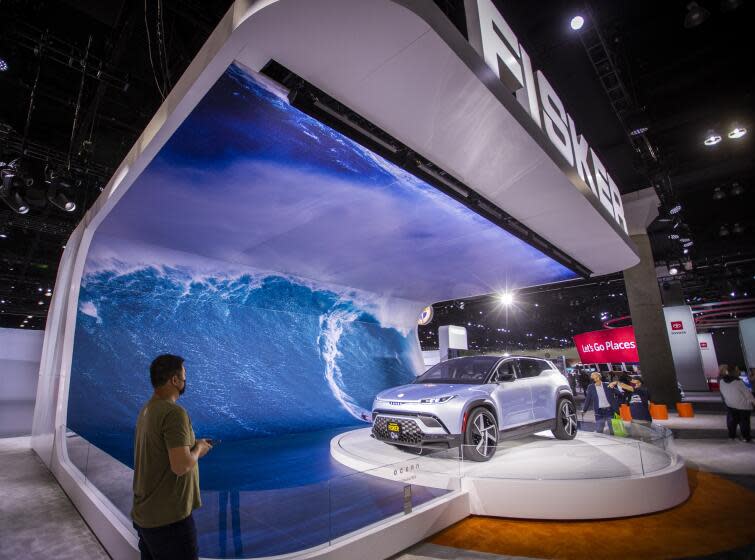Fisker files for bankruptcy protection amid heavy losses and struggling EV market

Fisker Group Inc., the struggling Manhattan Beach electric vehicle manufacturer, has filed for Chapter 11 bankruptcy protection.
After failing to secure financing to offset losses, the company reported in a filing with the U.S. Bankruptcy Court in Delaware that it had estimated liabilities of between $100 million and $500 million and more than 200 creditors. It listed estimated assets at between $500 million and $1 billion.
Read more: Fisker had big dreams to compete with Tesla. What went wrong?
“Like other companies in the electric vehicle industry, we have faced various market and macroeconomic headwinds that have impacted our ability to operate efficiently,” the company said in a prepared statement late Monday. “After evaluating all options for our business, we determined that proceeding with a sale of our assets under Chapter 11 is the most viable path forward for the company."
The bankruptcy filing marked the latest sign of struggles among EV-makers and came after Fisker had failed to line up financing from undisclosed automakers, reportedly including Nissan.
In March, Fisker said it failed to reach a strategic alliance with a major automaker, a requirement to obtain $150 million in additional financing. Its shares collapsed to pennies, prompting the New York Stock Exchange to delist the stock.
The company was founded in 2016 by Henrik Fisker, 60, a respected Danish American auto designer who worked on vehicles for BMW and Aston Martin. In 2007, he founded a prior company, Fisker Automotive, that produced the Fisker Karma, a $100,000-plus hybrid that drew rave reviews for its styling — and Hollywood celebrities for owners. However, the company went under in 2013 after several setbacks, including the bankruptcy of its battery supplier.
Fisker raised $1 billion in capital through its initial public offering in 2020 and was valued at over $2.9 billion at the time when there was widespread optimism about a rapid shift from gas models.
However, the recent rise in interest rates raised the price of vehicle loans and EV makers have struggled to expand the market beyond the first adopters and affluent customers who made Tesla one of the world's most valuable companies.
The company's flagship and only current model, a midsized SUV called the Ocean, was made at a contract manufacturing plant in Austria that has had production problems. Fisker had hoped to make as many as 42,400 Oceans last year but instead produced just 10,193 and delivered 4,929. The troubles took a toll on its finances, with the company reporting an annual loss of $762 million on sales of $273 million in 2023.
In an effort to clear its inventory and raise funds, Fisker in March slashed more than 30% off the suggested retail price of its 2023 lineup: three versions of the Ocean, including a base model that already started at just $38,999. In a delayed annual report finally released in April, the company said it had delivered more than 6,400 Oceans as of April 16.
However, its financial condition had continued to deteriorate. The company reported a cash balance of $326 million as of Dec. 31, which fell to $54 million in unrestricted funds as of April 16, according to regulatory filings.
In February, Fisker announced layoffs of 15% of its workforce and a six-week pause in production to clear inventory. It had 1,135 employees as of April 19, a reduction from 1,560 at the end of last year.
Read more: An electric SUV, inspired by California's environment. Is it more than a dream?
Last month, the company closed its Manhattan Beach headquarters that once housed 300 employees, and moved its remaining workers to an engineering and distribution facility in La Palma in Orange County.
In its latest venture, Fisker decided to sell vehicles with a flair that would appeal to a mass market. The Ocean, with its California beach-inspired design, features a full-length solar roof, an interior composed of "vegan" recycled plastic and a drop-down rear window that can fit a surfboard.
The design won awards, but the cars produced by Fisker's contract manufacturer in Graz, Austria, were riddled with software glitches, causing it to be ripped apart online. Fisker acknowledged the problems and issued a major software update in February, promising additional ones for the life of the vehicle.
Earlier this month, Fisker recalled 11,201 Oceans. The voluntary notice stemmed from a software glitch that may cause the premium sport utility vehicle to lose power. The National Highway Traffic Safety Administration previously opened four investigations into the vehicle, including one triggered by owner complaints that the SUV’s automatic emergency braking system randomly triggered.
Fisker's plan to sell the Ocean directly to customers, a business model Tesla popularized, also didn't work out, and the company shifted this year to a franchise network to market, sell and service its vehicles. It has been in the process of signing up franchisees in North America and Europe, where it planned a hybrid sales model that still included direct sales.
Fisker is far from the only automaker that has suffered from the slowdown in electric vehicle demand.
Rivian, an Irvine maker of electric trucks, has seen its stock drop by more than half in the past year and announced that it was pausing construction of its $5-billion manufacturing plant in Georgia.
Early this year, Apple pulled the plug on its self-driving electric vehicle program, reportedly after spending $10 billion over a decade.
And Lucid Motors, a maker of luxury electric vehicles in the Bay Area city of Newark, received a $1-billion infusion last month from an affiliate of the Saudi sovereign wealth fund — the kind of big backer that Fisker didn't have.
The Associated Press contributed to this report.
This story originally appeared in Los Angeles Times.

 Yahoo Finance
Yahoo Finance 